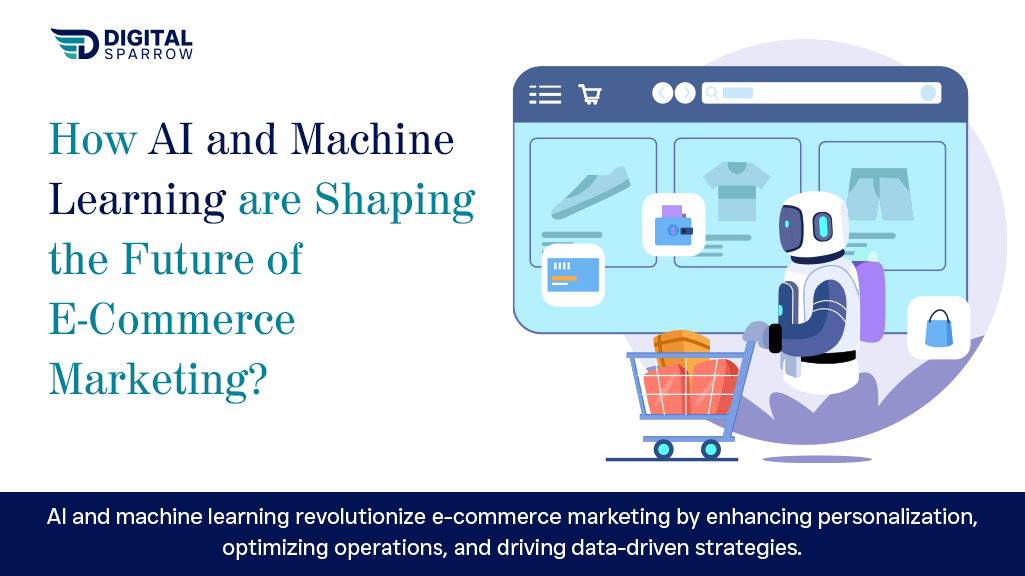Introduction:
E-commerce marketing has evolved rapidly over the last few years, with artificial intelligence (AI) and machine learning (ML) becoming integral to its transformation. These technologies are reshaping the way businesses operate, from personalizing customer experiences to optimizing logistics and inventory management. As the future of e-commerce marketing unfolds, AI and machine learning are at the core of creating more efficient, effective, and data-driven strategies.
- Understanding AI and Machine Learning in E-Commerce Marketing
What is AI and ML in the Context of E-Commerce Marketing?
AI refers to the simulation of human intelligence in machines, enabling them to perform tasks like speech recognition, decision-making, and visual perception. Machine learning, a subset of AI, involves algorithms that allow systems to learn and improve from experience without explicit programming.
In e-commerce marketing, AI and ML are used to enhance customer experience, streamline operations, and provide personalized product recommendations. These technologies are essential for staying competitive in the digital marketplace.
Why Are AI and Machine Learning Important for E-Commerce Marketing?
The e-commerce industry thrives on data, and AI-powered algorithms analyse this data to predict customer behaviour’s, optimize ad campaigns, and automate customer service. Machine learning enables businesses to predict trends, forecast demand, and offer real-time solutions to customer needs. As e-commerce marketing becomes more sophisticated, integrating AI and machine learning is no longer a luxury but a necessity.
- How AI is Changing Customer Experience in E-Commerce Marketing
Personalization and Recommendation Engines
AI-powered recommendation engines are one of the most influential tools in e-commerce marketing. They analyse customer data—browsing history, previous purchases, and behaviour patterns—to suggest products tailored to individual preferences. This personalization boosts customer satisfaction and increases conversion rates, making it a key element in e-commerce marketing.
Virtual Assistants and Chatbots
AI-driven chatbots and virtual assistants are reshaping customer service in e-commerce. These tools provide instant support to customers, handling queries, offering product recommendations, and resolving issues in real time. This improves the user experience, allowing businesses to operate 24/7 without increasing staff costs.
- Optimizing Ad Campaigns with AI and Machine Learning
Predictive Analytics for Better Targeting
AI and machine learning can analyse massive datasets to predict customer behaviour, enabling marketers to target potential buyers more accurately. These tools identify patterns and trends, allowing for precise audience segmentation, improving ad relevance, and ultimately boosting ROI on marketing spend.
Dynamic Pricing Strategies
AI helps businesses implement dynamic pricing strategies, adjusting product prices based on factors like demand, competition, and customer behaviour. Machine learning models monitor market trends and competitor prices, enabling businesses to offer competitive pricing while maintaining profitability.
- Enhancing Supply Chain and Inventory Management with AI
Demand Forecasting and Stock Optimization
Machine learning algorithms are increasingly used to forecast demand in e-commerce marketing. These algorithms analyse historical data and external factors such as market trends, economic indicators, and even weather conditions to predict product demand. This ensures optimal stock levels, reducing the chances of overstocking or understocking, both of which can harm profitability.
Automation in Warehousing and Logistics
AI-driven automation is transforming warehousing and logistics in e-commerce marketing. From automated picking and packing processes to intelligent inventory management systems, businesses are streamlining operations, reducing human error, and cutting down on delivery times. AI also powers autonomous delivery solutions like drones and self-driving vehicles, promising faster and more efficient deliveries.
- Improving Customer Retention with AI in E-Commerce Marketing
Sentiment Analysis and Feedback Loop
Sentiment analysis, driven by machine learning, helps e-commerce companies gauge customer satisfaction. By analysing customer reviews, feedback, and social media comments, businesses can detect issues early and make necessary adjustments to retain customers. AI also enables the creation of feedback loops that allow companies to continually improve their services.
AI-Driven Loyalty Programs
AI can optimize loyalty programs by analysing customer behaviour and identifying patterns that lead to repeat purchases. It can also personalize rewards and offers, making the loyalty program more appealing and increasing customer retention.
- AI in SEO and Content Creation for E-Commerce Marketing
AI-Generated Content
AI tools like natural language processing (NLP) are being used to create product descriptions, social media posts, and even blog content. While human creativity is still unmatched, AI can handle repetitive tasks, enabling marketers to focus on strategy and creativity.
Optimizing for Voice Search
As voice-activated devices like Alexa and Siri become more popular, optimizing for voice search is critical in e-commerce marketing. AI-powered tools help identify the keywords and phrases most commonly used in voice search, allowing businesses to tailor their content for this growing trend.
- The Future of AI and Machine Learning in E-Commerce Marketing
AI-Powered Augmented Reality (AR) Shopping Experiences
AI and AR are combining to offer immersive shopping experiences in e-commerce. Customers can virtually try on clothes, preview furniture in their homes, or test out makeup products. This innovation reduces return rates and enhances customer satisfaction.
Blockchain and AI for Secure Transactions
Blockchain technology, combined with AI, can revolutionize payment security in e-commerce marketing. AI can detect fraudulent transactions in real-time, while blockchain ensures transparency and security in the transaction process.
Conclusion: Embracing AI and Machine Learning for E-Commerce Marketing Success
AI and machine learning are not just trends but essential tools shaping the future of e-commerce marketing. From personalization to logistics, these technologies offer businesses the opportunity to enhance customer experiences, streamline operations, and increase profitability. As AI continues to evolve, its role in e-commerce marketing will only grow, making it crucial for businesses to adopt these technologies to stay competitive.



Değersiz içerik Google SEO, dijital pazarlama stratejimizde büyük bir fark yarattı. http://www.royalelektrik.com/esenyurt-elektrikci/
BWER empowers businesses in Iraq with cutting-edge weighbridge systems, ensuring accurate load management, enhanced safety, and compliance with industry standards.